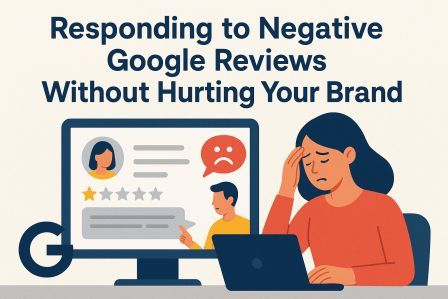In today’s digital world, online reviews can make or break a business. A single negative Google review can feel like a personal attack—and sometimes, it is. But here’s the good news: how you respond matters more than the review itself.

Whether you’re a local shop owner, a service provider, or run an online brand, understanding the art of responding to negative Google reviews is essential to your reputation, customer trust, and long-term success.
In this in-depth guide, you’ll learn:
- Why negative reviews matter
- How to respond effectively and professionally
- What to avoid when replying
- Examples of professional responses
- How to turn negative reviews into growth opportunities
Why Responding to Negative Google Reviews Matters
Negative reviews sting — but ignoring them makes things worse. Here’s why responding is critical:
1. Shows You Care
When potential customers see that you respond to complaints, they’re more likely to trust you. It shows you’re responsive, responsible, and professional.
2. Can Change the Reviewer’s Mind
An angry customer might update or delete their review if you resolve their issue respectfully and quickly.
3. Impacts SEO and Local Ranking
Google notices your engagement. Responding to reviews (positive and negative) can boost your local SEO visibility.
4. Influences Buying Decisions
According to BrightLocal, 89% of consumers read businesses’ responses to reviews before making a purchase or visiting a location.
Golden Rules for Responding to Negative Google Reviews
Stay Calm and Don’t Take It Personally
It’s natural to feel defensive. But remember: your response is public. Pause, breathe, and approach it as a customer service opportunity.
Respond Quickly
Timely responses (within 24–48 hours) show that you’re on top of your customer experience. It may also prevent the situation from escalating.
Be Polite and Professional
Even if the reviewer is rude or unfair, your tone should remain courteous. You’re not just writing for them—you’re writing for future customers too.
Acknowledge the Issue
Even if you believe the customer is mistaken, show empathy. Phrases like “I’m sorry to hear this happened” or “Thank you for your feedback” go a long way.
Offer a Solution or Take the Conversation Offline
Don’t argue online. Instead, invite the customer to contact you directly. This protects their privacy and shows others that you handle issues professionally.
What Not to Do When Responding to Negative Reviews
Don’t Argue Publicly
No matter how unjust the review feels, public arguments damage your credibility. Stay calm and composed.
Don’t Ignore or Delete Reviews
Unless a review violates Google’s policies (spam, hate speech, etc.), it’s best to respond constructively rather than attempt removal.
Don’t Use Generic or Copy-Paste Responses
People can tell when you’re using a template. Customize each response to show you’ve read and understood the reviewer’s concern.
A Simple Framework for Responding to Negative Reviews
Use this structure to keep your replies professional and effective:
- Thank them for their feedback
- Acknowledge their experience
- Apologize if appropriate
- Explain or clarify if needed
- Offer a solution or next step
- End on a positive and professional note
Real-World Examples of Responses to Negative Google Reviews
Example 1: For a Restaurant
Review:
“Terrible service. We waited 45 minutes for our food, and it was cold when it arrived.”
Response:
Hello [Reviewer Name], thank you for taking the time to share your experience. We’re truly sorry for the delay and that your meal didn’t meet our standards. This is not the level of service we aim to provide. We’d appreciate the opportunity to make it right. Please contact us at [email/phone]. Your feedback helps us improve, and we hope to serve you better in the future.
Example 2: For a Service-Based Business
Review:
“Very unprofessional team. They missed their appointment and never followed up.”
Response:
Hi [Name], we apologize for the inconvenience and communication breakdown. We understand how frustrating that must have been. Please reach out to us directly at [contact info] so we can address this issue and work toward a resolution. We value your feedback and want to regain your trust.
Example 3: For a Retail Store
Review:
“Products are overpriced and not worth it. Waste of money.”
Response:
Hi [Name], We’re sorry to hear you were disappointed with your purchase. We aim to provide high-quality products and services to every customer. We’d appreciate the opportunity to understand your concerns better. Please contact us at [contact info], and we’ll be happy to help. Thank you for bringing this to our attention.
Should You Ask Google to Remove a Negative Review?
Only do this if the review violates Google’s content policies. For instance:
- Spam or fake reviews
- Offensive or abusive language
- Irrelevant or off-topic content
If a review is simply negative but genuine, do not attempt removal. Instead, respond professionally and constructively.
Encouraging More Positive Reviews to Balance the Negative
A few bad reviews won’t hurt you if you have dozens (or hundreds) of glowing ones. Here’s how to encourage happy customers to share their experiences:
- Ask satisfied customers politely after a successful transaction
- Follow up via email with a review link
- Display signage at your business asking for feedback
- Train your team to encourage reviews during customer interactions
- Deliver consistent, excellent service every time
Important: Avoid offering incentives in exchange for reviews—it goes against Google’s guidelines and may backfire.
Tools to Help Manage and Respond to Reviews
Here are some tools that can simplify the process:
- Google Business Profile: Manage your reviews, respond, and update your business info
- Reputation management platforms: Tools like Podium, Birdeye, and Trustpilot offer centralized dashboards for review monitoring
- Review link generators: These tools create a direct link to your Google review page to make it easy for customers to leave feedback
When to Bring in a Reputation Management Expert
If you’re overwhelmed by responding to negative Google reviews or if a situation has gone viral or out of control, it may be time to bring in a professional.
Reputation experts can help:
- Craft customized responses
- Suppress false or defamatory content
- Improve your overall review profile
- Guide your team on how to handle feedback
Final Thoughts:
Responding to Negative Google Reviews isn’t the end of the world—they’re opportunities in disguise. They offer real insights into what your customers expect and how you can improve.
When you respond with care, professionalism, and a solution-focused mindset, you don’t just protect your reputation—you enhance it. Customers notice brands that listen, respond, and take action.
So don’t fear negative reviews. Embrace them, learn from them, and use them to build a business that’s stronger, smarter, and more customer-focused than ever.






